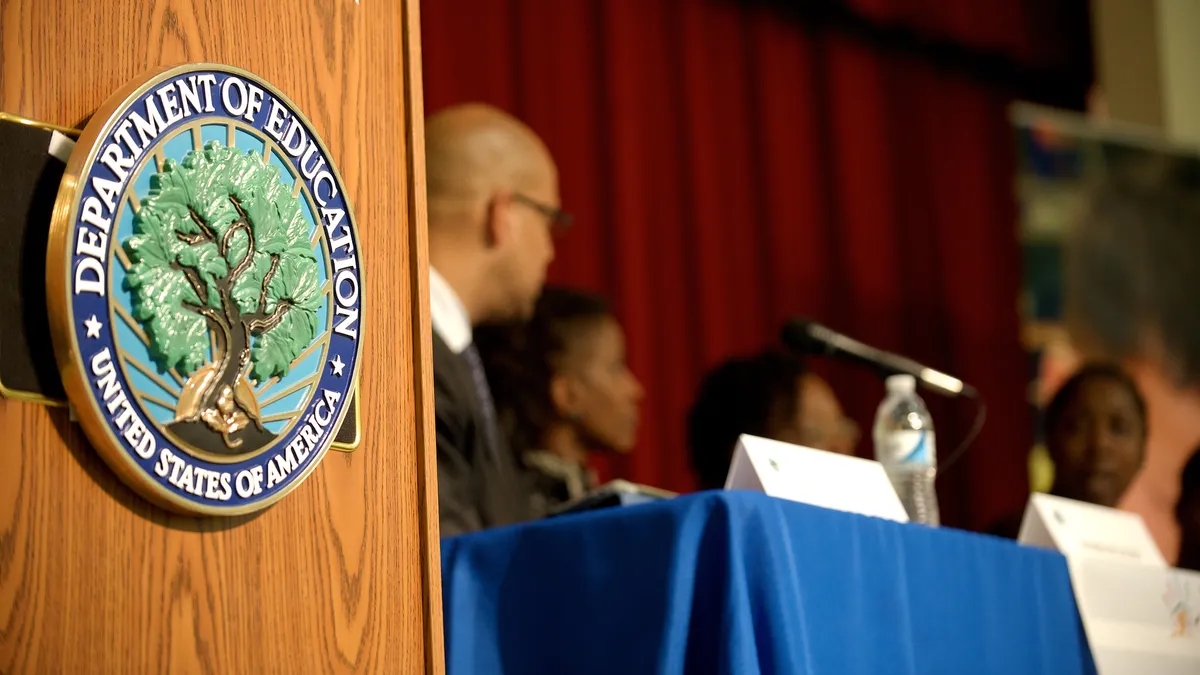Dive Brief:
- Some private college owners must agree to be financially liable in case of events like their students requiring loan forgiveness under a new U.S. Department of Education policy announced Wednesday.
- Private institutions' controlling entities in some cases must comply with the new department rules in order to receive federal Title IV financial aid, which most colleges need to balance their budgets and remain operational.
- The new measures add to a Biden administration campaign to hold accountable institutions with poor student outcomes, with a heavy emphasis on for-profits.
Dive Insight:
In order to unlock federal aid, colleges sign a program participation agreement with the government pledging to follow the Higher Education Act and maintain their financial health.
Typically, a chief executive or other designated college official gives their signature on these agreements. However, in some scenarios the Education Department is now also demanding signatures from corporations or entities that control some private colleges.
The department specifically said it might require signatures from entities that are sole members or hold all voting interest in an institution, as well as entities that hold 50% or more interest in an institution. That includes direct and indirect equity and voting interest in combination with other members. Entities that provide audited financial statements on institutions' behalf may also be required to sign.
The agency determines when it will ask for additional signatures. It may do so if a private college changes owners or the department has already flagged it as having shaky finances, for instance. The education secretary may also find an entity does not have to sign.
Private colleges' owners would need to pay the tab on student loan discharges in cases like an institution closing or students needing their loan debt cleared because they were misled about academics or earnings potential.
These changes apply immediately in some scenarios, including agreements issued because of a change in ownership.
This could come into play with the department's recent efforts to forgive student loan debt under a regulation known as borrower defense to repayment. The provision can erase the debt of students whose colleges deceived them over aspects of their programming, such as credit transferability or job prospects.
Last month, the Education Department wiped away $415 million in loan debt for about 16,000 borrowers under the regulation.
All were students who attended for-profit colleges. Notably, it was the first time the Education Department used borrower defense for students who attended an institution that is still open, DeVry University. Officials said they would seek to recoup costs of debt cancellation from DeVry, which accounted for nearly $72 million of the announced loan cancellations.
"If a company owns, controls, or profits from a college, it should also be on the hook if the institution fails students," Undersecretary of Education James Kvaal said in a statement Wednesday. "Today's steps will ensure taxpayers aren't held liable for colleges that fail their students or close their doors, especially without the opportunity for students to finish their courses of study."
Career Education Colleges and Universities, which represents for-profit institutions, urged against a broad approach to pursuing money from college owners. Details about specific situations should dictate whether regulators "pierce the corporate veil," or hold owners liable for a business's debts, according to the association.
"The U.S. Department of Education should take into account all circumstances surrounding an institutional closure before taking the extraordinary step of piercing the corporate veil to reach the assets of the corporate parent," Jason Altmire, the association's president and CEO, said in a statement.
The Biden administration has so far canceled $3.2 billion in debt owed by borrowers who were defrauded or saw their colleges close. These students attended the for-profit chains ITT Technical Institute, Corinthian Colleges and other institutions.
Several federal agencies have signaled a crackdown on proprietary institutions. In October, the Federal Trade Commission notified the 70 largest for-profit colleges in the U.S. that it has authority to seek civil penalties against companies that engage in deceptive or unfair practices.
And in January, the Consumer Financial Protection Bureau said it will examine private student lending at colleges, citing practices at two shuttered for-profits.
The Education Department just wrapped up negotiations with representatives across the higher ed sector on regulatory proposals, several of which target for-profits. The agency did not find consensus on many issues but reached an agreement on a new 90/10 rule, which dictates how much revenue for-profits can derive from the federal government.
This story has been updated with a comment from Career Education Colleges and Universities.















